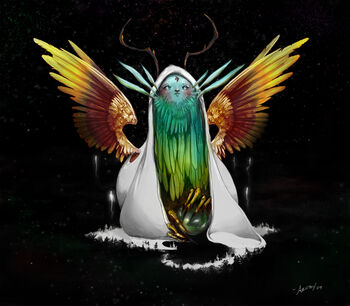
A deity.
A deity, also known as Elohim or god and goddess, is a being with powers far greater than those of humans, demons, monsters, and most angels, but who interacts with humans, positively or negatively, in ways that carry humans to new levels of consciousness beyond the grounded preoccupations of ordinary life.
Deities are depicted in a variety of forms, but are also frequently expressed as having human form. Some faiths and traditions consider it blasphemous to imagine or depict the deity as having any concrete form.
Various cultures have conceptualized a deity differently than a monotheistic God. A deity need not be omnipotent, omnipresent, omniscient, omnibenevolent, eternal. A monotheistic God is almighty, omnipresent, omniscient, omnibenevolent and eternal. Monotheistic religions typically refer to God in masculine terms, while other religions refer to their deities in a variety of ways such as masculine, feminine, androgynous and gender neutral.
Deities are often thought to be immortal, and are commonly assumed to have personalities and to possess consciousness, intellects, desires, and emotions comparable but usually superior to those of humans. A male deity is a god, while a female deity is a goddess. They were thought to be able to work supernatural miracles and to be the authorities and controllers of various aspects of human life (such as birth or an afterlife).
Historically, many ancient cultures such as Ancient Greece, Ancient Rome, Nordic culture and Asian culture associated or identified deities with natural phenomena, as their powers but not as causes. Some Avestan and Vedic deities were viewed as ethical concepts. In Indian religions, deities have been envisioned as manifesting within the temple of every living being's body, as sensory organs and mind.
Some deities were asserted to be the directors of time and fate itself, the givers of human law and morality, the ultimate judges of human worth and behavior, or designers of the Universe, instead of being a natural result of the laws of physics. Some deities are thought to be invisible or inaccessible to humans, dwelling mainly in otherworldly, remote or secluded and holy places, such as the concepts of Heaven, and Hell, the sky, the underworld, under the sea, in the high mountains or deep forests, or in a supernatural plane or celestial sphere.
Typically, they rarely reveal or manifest themselves to humans, and make themselves known mainly through their effects. Monotheistic deities are often thought of as being omnipresent, though invisible. However, they can be sensed and even seen by other supernatural beings, but even though they can sometimes allow themselves to be unseen by the supernatural beings, it doesn't stop the latter from sensing them regardless. The boundary between human and divine in most cultures is by no means absolute. Demigods are the offspring from a union of a human with a deity, and most royal houses in Antiquity claimed divine ancestors.